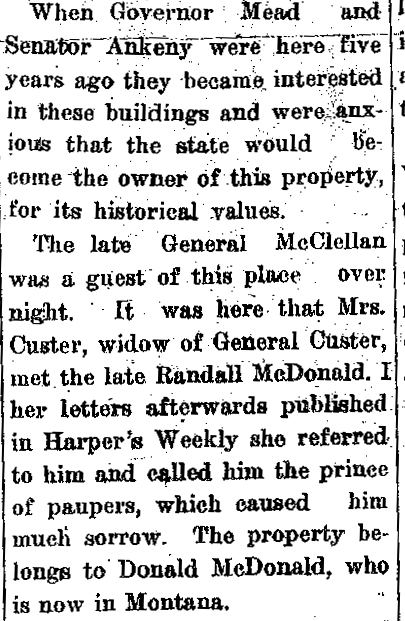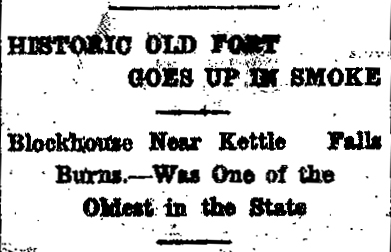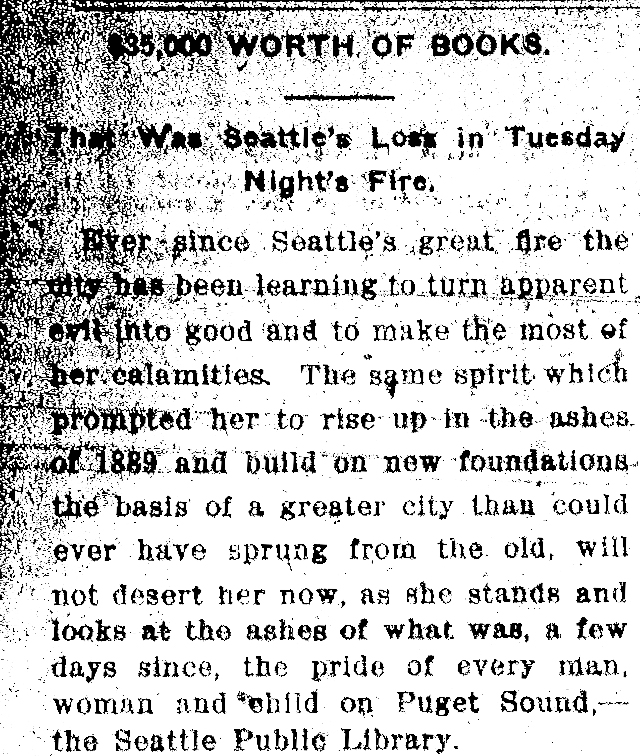From the desk of Steve Willis, Central Library Services Program Manager of the Washington State Library:
First there was Fort Colvile, the Hudson’s Bay Fort in present day Stevens County. Later, at another location a few miles away, there was Fort Colville, the U.S. military fort. As you can see by the spelling, the original Fort Colvile had the “L” kicked out of it. This randomly found article in the July 15, 1910 Chewelah Independent described how Fort Colvile was lost to history:
HISTORIC OLD FORT GOES UP IN SMOKE
Blockhouse Near Kettle Falls Burns. — Was One of the Oldest in the State
“The old Hudson Bay fort and group of buildings one-half mile from the Kettle Falls was destroyed by fire last week. The buildings were commenced in 1824 and finished the following year. The long frame building used for office and living purposes was burned and rebuilt in 1861. The old fort or blockhouse is said by some to be one of the oldest buildings in the state.”
“When Governor Mead and Senator Ankeny were here five years ago they became interested in these buildings and were anxious that the state would become the owner of the property, for its historical values.”
“The late general McClellan was a guest of this place over night. It was here that Mrs. Custer, widow of General Custer, met the late Randall McDonald. In her letters afterwards published in Harper’s Weekly she referred to him and called him the prince of paupers, which caused him much sorrow. The property belongs to Donald McDonald, who is now in Montana.”
“Many old relics were destroyed among them being an old flintlock musket. The old fort was substantially built of hewn logs, and was in a good state of preservation. The bullet holes in it could be counted by thousands. The cause of the fire is unknown.”
“The old fort was built in 1826 by Donald McDonald, Sr., who was at one time in command of the Hudson Bay company, which established trading posts at different points over the northwest, and was bequeathed by him to his son, Donald McDonald, who still owns the property. Books more than 100 years old formed a large portion of the library, besides there were contained in the confines of its walls curios of almost inestimable value.”
“The little old cannon used in the defense of the fort in the early days, saw service in the battle of Waterloo when the combined armies of Europe defeated the legions of France.”
The Fort Colvile library must have been one of the very earliest in Pacific Northwest history, making the place a cultural as well as economic center for the Inland Empire. Washington would not have a library supported by public funds until the creation of the Washington Territorial Library (now Washington State Library) in 1853. About 800 volumes from that initial WTL/WSL collection still exist.
In Book 1 of the Colville Collection, author David H. Chance traces the rise and fall of the fort in detail. After the land was abandoned by the Hudson’s Bay Company in 1871 it fell into various disputes of ownership. When the 20th century rolled around, the government was starting to recognize the historical value of the site and began to express an interest in preserving it. But that came to a fiery end in 1910. By coincidence, nearby St. Paul’s Mission burned down on the same day as the fort, leading some to speculate the buildings were torched by certain developers. But as Chance concludes, “There is no evidence to warrant anything more than suspicion.”
But if fire had not destroyed what remained of Fort Colvile, water probably would’ve finished the job 30 years later when the Grand Coulee Dam was built, creating Franklin D. Roosevelt Lake and submerging Fort Colvile’s site. During occasion drawdowns the area is visited by archaeologists, but the site is really counted as a piece of history you’ll need scuba gear to visit.









